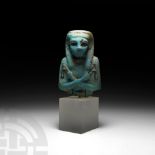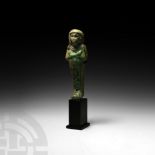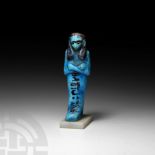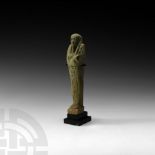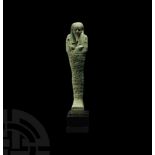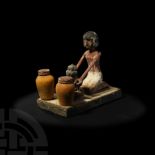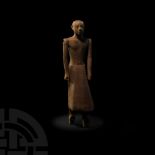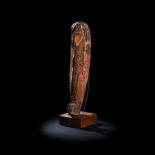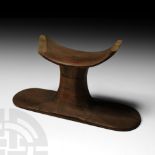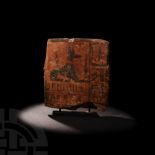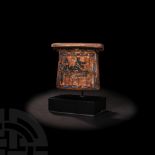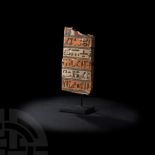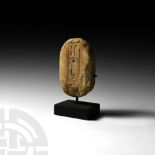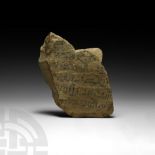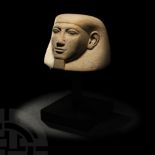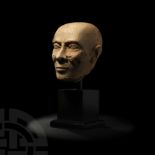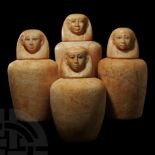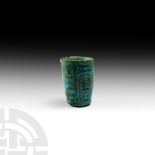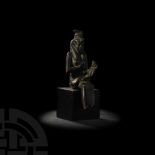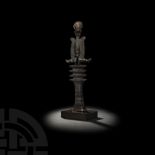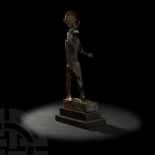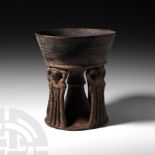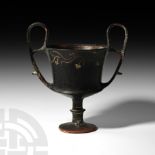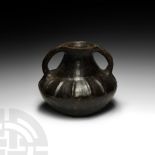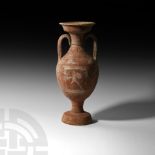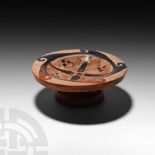Refine your search
Estimate
Category
- Collectables (103)
- Jewellery (59)
- Greek, Roman, Egyptian & Other Antiquities (54)
- Arms, Armour & Militaria (49)
- Sculpture (35)
- Books & Periodicals (28)
- Coins (24)
- Ceramics (19)
- Salvage & Architectural Antiques (13)
- Taxidermy & Natural History (12)
- Glassware (11)
- Islamic Works of Art (10)
- Metalware (10)
- Textiles (10)
- Scientific Instruments (9)
- Furniture (7)
- Chinese Works of Art (6)
- Porcelain (6)
- Oil, Acrylic paintings & Mixed Media (5)
- Silver & Silver-plated items (4)
- Stamps (4)
- Watercolours (4)
- Lighting (3)
- Russian Works of Art (3)
- Ethnographica & Tribal Art (2)
- Models, Toys, Dolls & Games (2)
- Musical Instruments & Memorabilia (2)
- Kitchenalia (1)
- Prints (1)
- Sporting Memorabilia & Equipment (1)
- Tools (1)
- Vintage Fashion (1)
- Watches & Watch accessories (1)
- List
- Grid
A subscription to the Price Guide is required to view results for auctions ten days or older. Click here for more information
Late Period, 30th Dynasty, 380-343 BC. A complete wooden gesso-painted sarcophagus of female form housed in a custom-built Edwardian glazed wooden...
Saite Period, 26th Dynasty, 664-525 BC. A bronze cat modelled seated, its tail wrapped around one side of its body and resting on a front paw, wea...
Egyptian Faience Shabti
Third Intermediate Period, 22nd Dynasty, c.935-730 BC. A large turquoise-glazed faience shabti figurine with the upper half surviving, wearing a t...
New Kingdom, 1550-1070 BC. A carved red jasper shabti fragment comprising the head and shoulders, wearing a tripartite wig; mounted on a custom-ma...
New Kingdom, 19th Dynasty, 1292-1189 BC. A blue-glazed composition shabti figurine for prince Khaemwaset wearing a bag wig with the sidelock of a ...
21st Dynasty, 1069-945 BC. A bright turquoise-glazed mummiform shabti figure wearing a tripartite wig, arms crossed and holding two hoes; the wig ...
Late Period, 525-332 BC. A pale-blue glazed composition mummiform shabti figurine wearing a tripartite wig and false beard, sharp facial detailing...
26th Dynasty, 664-525 BC. A substantial light blue glazed composition shabti figurine belonging to a man named Nes-Ptah, a Sameref-priest and prop...
Third Intermediate Period, 22nd Dynasty, 945-720 BC. A green-glazed composition shabti figurine wearing a tripartite wig with seshed fillet painte...
New Kingdom, 1525-1070 BC. A large glazed composition shabti with tripartite wig and hooked false beard, seed-bag to the left shoulder, nekhakha f...
Late Kingdom-Third Intermediate Period, c.1550-702 BC. A large terracotta mummiform shabti with lentoid-section body, arms crossed at the chest, f...
Middle Kingdom, 12th-11th Dynasty, 2133-1797 BC. A polychrome wooden figural group composed of a kilted male figure with short hair kneeling on a ...
Middle Kingdom,12th-11th Dynasty, 2133-1797 BC. A painted male figure standing on a sub-rectangular platform, wearing a short kilt and with anatom...
Second Intermediate Period, c.1600 BC. A carved wooden statue modelled in the round as a nobleman striding forwards wearing a shin-length kilt, mo...
Egyptian Wooden Stick-Shabti
17th-18th Dynasty, 1580-1290 BC. A wooden shabti figurine with a large wedge-shaped face with the eyes, nose and mouth drawn in black; wearing a s...
Egyptian Wooden Headrest
New Kingdom, 18th Dynasty, c.1550-1295 BC. A carved wooden headrest formed from three sections, fluted shaft resting on a broad base, the neck sup...
Late Period, 664-332 BC. A rectangular section from a wooden coffin with Anubis in canine form, the feather of Ma'at between the front legs, flail...
Late Period, 525-332 BC. A rectangular section of a polychrome wooden coffin, to the centre of the panel three vertical columns of hieroglyphic te...
Late New Kingdom, 1550-1070 BC. A bifacial faience pectoral with the obverse painted with a scene of Anubis; the reverse painted with a djed pilla...
Late Period, 664-332 BC. A section of wooden stela from an arch, bearing five rows of hieroglyphs on gesso, reading from right to left, at the ver...
Egyptian Painted Mummy Face
Roman Period, 30 BC-476 AD. A wooden head modelled in the half-round and composed of wood, linen and an outer gesso covering with polychrome paint...
Third Intermediate-Late Dynastic Period, c. 730-332 BC. A carved cedar wood funerary mask from a sarcophagus with plaster surface painted with fac...
New Kingdom, 18th Dynasty, 1388-1351 BC. A carved limestone papyrus burnisher with rounded edges; a single column to the centre with a cartouche c...
Late New Kingdom, 1300-700 BC. A substantial limestone ostracon with several lines of hieratic writing to both sides, the six lines of script on t...
4th-5th century AD. A limestone relief with facing figure of the deceased resting on a triclinium, the body wrapped in long sleeved chiton and him...
4th-5th century AD. A carved stone funerary stela bearing the figure of a man in low relief, his hands raised in the orans attitude of worship, dr...
Middle Kingdom-New Kingdom, c.1976-1069 BC. A finely carved canopic jar lid in the form of a human head, wearing a wig and false beard, with seren...
Roman Period, 30 BC-323 AD. A carved limestone head of a priest with shaven head, finely modelled facial features, lined forehead; mounted on a cu...
Early New Kingdom, 1550-1070 BC. An important set of alabaster canopic jars with human-headed stoppers, each individually modelled with exposed ea...
c.3rd millennium BC. A terracotta storage jar with slender piriform body tapering to a rounded base, rolled rim. Cf. The Metropolitan Museum, acce...
Egyptian Breccia Stone Vase
Early Dynastic Period, 3rd millennium BC or later. A carved breccia vessel with piriform body, everted rim, two integral loop handles and discoid ...
New Kingdom, 1550-1070 BC. A veined alabaster jar with domed D-section body and everted rim. 1.13 kg, 13cm wide (13 1/4"). Abelita family collect...
Late Period, 664-332 BC. A polished stone alabastron with elongated piriform body, collared shoulder, short, tubular neck and flat base; mounted o...
Egyptian Storage Vessel
New Kingdom, 1550-1070 BC. A ceramic storage vessel with piriform body and everted rim, slightly convex base. 595 grams, 18.5cm high (7 1/4"). Ac...
Ramesside Period, 19th Dynasty, 1212-1202 BC. A vibrant turquoise-glazed faience offering cup, the thickened rim with painted black detailing; two...
New Kingdom, 1550-1070 BC. A blue-glazed faience dish with carinated body, inverted rim and small basal ring, decoratively segmented using painted...
Third Intermediate Period, 1069-702 BC. A bronze figurine of seated Isis wearing a tripartite wig, crown and uraeus, with the infant Horus on her ...
Late Period, 525-332 BC or earlier. A large bronze religious symbol comprising a djed pillar with flared base and transverse rectangular blocks su...
Third Intermediate Period, 1069-702 BC. A substantial bronze figure of Re-Horakhty standing in advancing pose on a rectangular base; the god model...
Egyptian Osiris Statuette
Late Period, 525-332 BC or earlier. A bronze figure of Osiris standing in mummiform shroud with nekhakha flail and heka short-handled crook in the...
Ptolemaic Period, 332-30 BC. A bronze Apis bull statuette modelled in the round, advancing on a rectangular base, a solar disc held between horns,...
Late Period, 525-332 BC. A bronze Wedjat eye with detailing in relief. 101 grams, 63mm (2 1/2"). Acquired in the 1970s. Property of a London gent...
Middle Kingdom, 2133-1797 BC or later. A group of two carved amethyst scarabs, each with engraved detailing to the carapace and pierced from head ...
Late New Kingdom, 1550-1070 BC. A mixed group of carnelian scarabs, each with varying degrees of detailing to the carapace and legs; each pierced ...
Third Intermediate Period, 1069-702 BC. A restrung collar necklace composed of slender tubular faience beads; accompanied by a note issued by Chri...
Ptolemaic Period, 305-30 BC. A restrung netted beadwork panel of annular and tubular glazed composition mummy beads in blues, greens, black, cream...
1st century BC-2nd century AD. A gold circular mount comprising the eye of Ra surrounded by animals in low-relief, among which we can recognise a ...
Egyptian Gold Cat Amulet
Third Intermediate Period, 1069-702 BC. A gold amuletic pendant of a sitting cat, associated with the goddess Bastet, on a tongue-shaped base with...
Ptolemaic-Roman Period, 3rd century BC-4th century AD. A sealed rolled papyrus scroll with demotic(?) script in ink. 26.6 grams, 21cm wide (8 1/4"...
Late Period- Ptolemaic Period, 664-30 BC. A fragmentary granite statue of Horus in falcon form, protecting the god Osiris; the god of the underwor...
New Kingdom, 1550-1070 BC or later. A fragment of a black granite statue of a noble showing the bent legs of a kneeling figure with toes splayed, ...
Roman Period, 30 BC-323 AD. A carved bone token depicting two opposed children facing each other on a plano-convex base; inscribed to the reverse ...
7th-6th century BC. A Bucchero chalice composed of a carinated bowl, waisted stem and splayed foot, four standing caryatid figures to the circumfe...
5th-3rd century BC. A ceramic blackware kantharos vessel with trumpet-shaped foot, drum-shaped bowl with carinated lower edge, flared rim, two loo...
c.9th century BC. A Villanovian black-glazed amphora with twin handles and sloping body, short neck with flared rim, stylised ridges to the body. ...
Etruscan Bucchero Chalice
7th-6th century BC. A Rasmussen’s type 2d Bucchero pottery chalice, composed of a carinated bowl, collared stem and splayed foot, the upper body e...
4th century BC. A ceramic blackware stemmed kylix with carinated bowl and two arched strap handles. 210 grams, 14cm diameter (5 1/2"). UK collect...
5th-3rd century BC. A terracotta amphora with carinated body, two D-section handles, waisted neck, stepped mouth and everted rim, stem and substan...
c.4th-3rd century BC. An Etruscan high-footed shallow plate of pale brown clay, flared rim with wide, everted lip, supported by a short stem and w...
c.4th-3rd century BC. A polychrome kantharos of low profile, the outer body with circumferential band of rounded spikes and two small loop handles...




